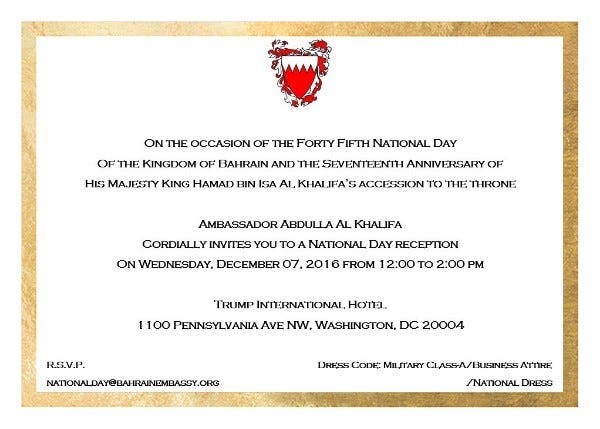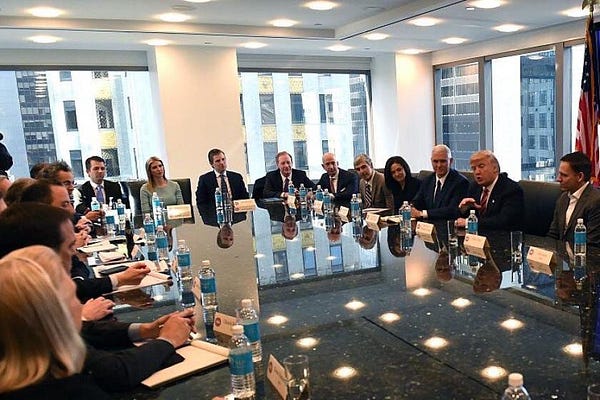By Judd Legum and Kira Lerner
The Embassy of Kuwait allegedly canceled a contract with a Washington, D.C. hotel days after the presidential election, citing political pressure to hold its National Day celebration at the Trump International Hotel instead.
A source tells ThinkProgress that the Kuwaiti embassy, which has regularly held the event at the Four Seasons in Georgetown, abruptly canceled its reservation after members of the Trump Organization pressured the ambassador to hold the event at the hotel owned by the president-elect. The source, who has direct knowledge of the arrangements between the hotels and the embassy, spoke to ThinkProgress on the condition of anonymity because the individual was not authorized to speak publicly. ThinkProgress was also able to review documentary evidence confirming the source’s account.
In the early fall, the Kuwaiti Embassy signed a contract with the Four Seasons. But after the election, members of the Trump Organization contacted the Ambassador of Kuwait, Salem Al-Sabah, and encouraged him to move his event to Trump’s D.C. hotel, the source said.
Kuwait has now signed a contract with the Trump International Hotel, the source said, adding that a representative with the embassy described the decision as political. Invitations to the event are typically sent out in January.
Abdulaziz Alqadfan, First Secretary of the Embassy of Kuwait, told ThinkProgress last week that he couldn’t “confirm or deny” that the National Day event would be held at the Trump Hotel. Reached again Monday afternoon, Alqadfan did not offer any comment. An email sent directly to Ambassador Al-Sabah was not immediately returned.
Mallory Harney, a sales and marketing official with the Trump hotel, declined to comment.
The apparent move by the Kuwaiti Embassy appears to be an effort to gain favor with president-elect through his business entanglements, and it appears to show Trump’s company leveraging his position as president-elect to extract payments from a foreign government. The latter, according to top legal experts, would be unconstitutional and could ultimately constitute an impeachable offense.
A global pressure campaign
The Trump Organization’s pressure campaign has not been limited to Kuwait. The country was targeted as part of a larger effort by the Trump Organization to lure lucrative diplomats to the Trump International Hotel.
It’s working.
Kuwait canceled with the Four Seasons a few days after the Trump International Hotel held an event for diplomats, reported the Washington Post, encouraging them to patronize the hotel.
At the event, conversation among diplomats reportedly centered around “how are we going to build ties with the new administration,” according to the Post. One Middle Eastern diplomat told the Post that he or she expects foreign entities to begin holding events and booking stays at the hotel. “Believe me, all the delegations will go there,” the diplomat said.
Less than two weeks after that event, Politico reported that Bahrain, another Middle Eastern monarchy, would host its National Day reception at the Trump hotel on December 7.

Congressman Jim McGovern (D-MA) harshly criticized the Bahrain event, writing in a letter to Trump that he should “reject all business income from the Bahraini monarchy and all other foreign governments.” McGovern wrote that Trump’s “private commercial dealings with a repressive governments” endanger the fundamental principle that the president will “act solely in our country’s interests.”
The Republic of Azerbaijan also recently co-hosted a Hanukkah party at the Trump hotel, despite the anti-Semitic undertones of the Trump campaign. Rabbi Rick Jacobs, president of the Union for Reform Judaism, blasted the decision as “tone deaf at best, naked sycophancy at worst.”
Smaller countries like Kuwait, Bahrain, and Azerbaijan may perceive patronizing the Trump Hotel as an easy way to gain access and favor with the incoming Trump administration.
To drive the effort to draw in business from embassies, the Trump Hotel poached a manager from the Four Seasons to be the “director of diplomatic sales.”
“The temptation and the inclination will certainly be there. Some might think it’s the right way to engage, to be able to tell the next president, ‘Oh, I stayed at your hotel,” a former ambassador to Mexico told the Washington Post.
Trump contributed to the impression that his businesses and administration are intertwined by naming three of his children to his transition team, while also saying that the children will manage his companies.
Trump planned to explain in a press conference this month how his businesses would operate after he assumes office, but he has postponed the announcement indefinitely.
Ivanka, Eric, and Donald Jr., meanwhile, have all been featured in public transition events. The transition team handed out a photo of Ivanka meeting with the Japanese Prime Minister Shinzo Abe, and a summit with a group of top American tech leaders held last week featured all three Trump children perched at the head of the table.


In several cases during the transition, foreign leaders have been able to get in touch with President-elect Trump through his business contacts.
Not just unethical, unconstitutional
Donald Trump and the businesses he owns and controls do not seem concerned about mixing his business and official activities. “The law is totally on my side, meaning, the president can’t have a conflict of interest,” Trump told the New York Times.
Although the president is exempt from some conflict-of-interest laws, the Congressional Research Service recently identified nine federal conflict of interest and ethics provisions that could apply to the president.
One looms large over the apparent hotel deal with the Kuwaitis: The Emoluments Clause of the Constitution, which prohibits the president from receiving money from a foreign government or head of state.
According to Democratic and Republican legal experts, such a payment is not only unconstitutional, it’s an impeachable offense.





















COMMENTS